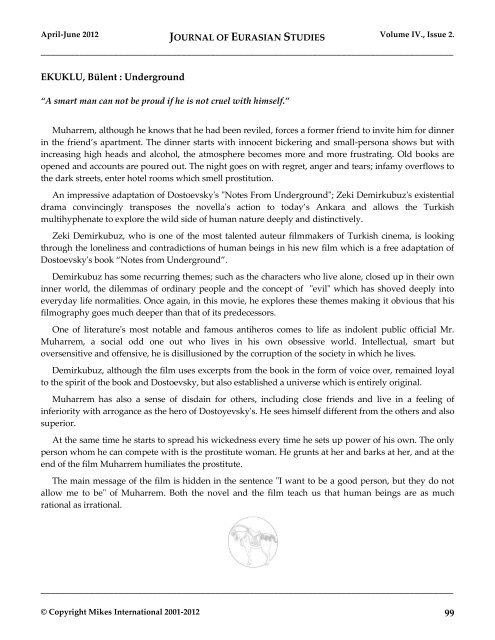You also want an ePaper? Increase the reach of your titles
YUMPU automatically turns print PDFs into web optimized ePapers that Google loves.
April-June 2012 JOURNAL OF EURASIAN STUDIES Volume IV., Issue 2.<br />
_____________________________________________________________________________________<br />
EKUKLU, Bülent : Underground<br />
“A smart man can not be proud if he is not cruel with himself.”<br />
Muharrem, although he knows that he had been reviled, forces a former friend to invite him for dinner<br />
in the friend’s apartment. The dinner starts with innocent bickering and small-persona shows but with<br />
increasing high heads and alcohol, the atmosphere becomes more and more frustrating. Old books are<br />
opened and accounts are poured out. The night goes on with regret, anger and tears; infamy overflows to<br />
the dark streets, enter hotel rooms which smell prostitution.<br />
An impressive adaptation <strong>of</strong> Dostoevsky's "Notes From Underground"; Zeki Demirkubuz's existential<br />
drama convincingly transposes the novella's action to today’s Ankara and allows the Turkish<br />
multihyphenate to explore the wild side <strong>of</strong> human nature deeply and distinctively.<br />
Zeki Demirkubuz, who is one <strong>of</strong> the most talented auteur filmmakers <strong>of</strong> Turkish cinema, is looking<br />
through the loneliness and contradictions <strong>of</strong> human beings in his new film which is a free adaptation <strong>of</strong><br />
Dostoevsky's book “Notes from Underground”.<br />
Demirkubuz has some recurring themes; such as the characters who live alone, closed up in their own<br />
inner world, the dilemmas <strong>of</strong> ordinary people and the concept <strong>of</strong> "evil" which has shoved deeply into<br />
everyday life normalities. Once again, in this movie, he explores these themes making it obvious that his<br />
filmography goes much deeper than that <strong>of</strong> its predecessors.<br />
One <strong>of</strong> literature's most notable and famous antiheros comes to life as indolent public <strong>of</strong>ficial Mr.<br />
Muharrem, a social odd one out who lives in his own obsessive world. Intellectual, smart but<br />
oversensitive and <strong>of</strong>fensive, he is disillusioned by the corruption <strong>of</strong> the society in which he lives.<br />
Demirkubuz, although the film uses excerpts from the book in the form <strong>of</strong> voice over, remained loyal<br />
to the spirit <strong>of</strong> the book and Dostoevsky, but also established a universe which is entirely original.<br />
Muharrem has also a sense <strong>of</strong> disdain for others, including close friends and live in a feeling <strong>of</strong><br />
inferiority with arrogance as the hero <strong>of</strong> Dostoyevsky's. He sees himself different from the others and also<br />
superior.<br />
At the same time he starts to spread his wickedness every time he sets up power <strong>of</strong> his own. The only<br />
person whom he can compete with is the prostitute woman. He grunts at her and barks at her, and at the<br />
end <strong>of</strong> the film Muharrem humiliates the prostitute.<br />
The main message <strong>of</strong> the film is hidden in the sentence "I want to be a good person, but they do not<br />
allow me to be" <strong>of</strong> Muharrem. Both the novel and the film teach us that human beings are as much<br />
rational as irrational.<br />
_____________________________________________________________________________________<br />
© Copyright Mikes International 2001-2012 99
















